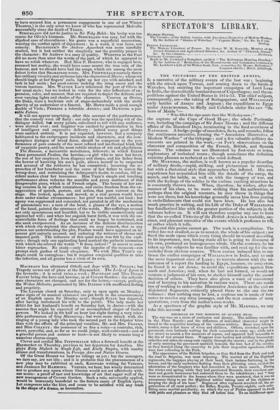MACREADY has alternated Othello and 'ago with Mr. PHELPS ;
but Tragedy seems out of place at the Haymarket. The Lady if Lyons is the favourite : it is acted twice a week. ; MACREADY and Miss 1'I BEEN FAUCIT being the hero and heroine, as at Covent Garden : the subordi- nate characters are changed, and not for the better,—except, perhaps, the Widow Melnotte, personated by Mrs. DANSON with unaffected feeling and propriety. The Lyceum closed on Saturday, only to open again on Monday : some signs of its musical existence are put forth in the announcement of an English opera for Monday next ; though Balms has departed, after having introduced his wife to the public. The lady made her &hilt for her husband's benefit on Saturday last, in Angina—with the success that might be expected of an accomplished singer of limited powers. We looked in for half an hour last night during a very toler- able performance of Guy Mannering ; but were more struck with the singing of a young lady who took the second part in the Gipsies' Glee than with the efforts of the principal vocalists, Mr. and Mrs. FRANKS, and Miss COLLETT : the possessor of so fine a voice—a contralto, rich, sweet, powerful, and, so far as we could judge, well-cultivated—and of a graceful person and manner to boot—is not likely to remain long a nameless chorus-singer. Clever and cordial Mrs. FITZWILLTAM takes a farewell benefit at the Haymarket on Thursday, previous to her departure for Amelica. She plays Kitty Skylark in Single Life, and Emily Staples, with sundry aliases and transformations, in Foreign Airs and Native Graces. Of the Great Houses we hear no tidings as yet ; but the managers, we dare say, are not idle ; and it is probable that the phsenomenon of a new play may be exhibited at each, KNOWLES writing for VESTRIS, and JERROLD for HAMMOND. VESTRIS, we hear, has wisely determined not to produce any opera whose libretto would not act effectively with- out music : a proof of tact and knowledge of art that augur well of the new management of Covent Garden. Such a rule, universally applied, would be immensely beneficial to the forlorn cause of English opera. Let composers take the hint, and cease to be satisfied with any trash in the shape of a drama, as heretofore.


























 Previous page
Previous page